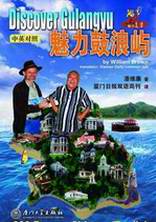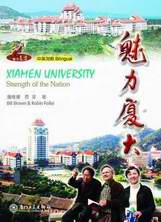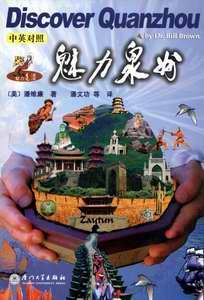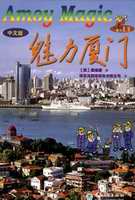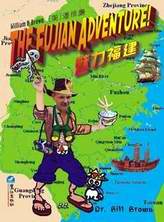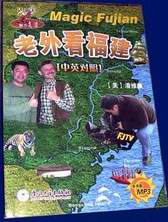![]() Click
to
Access
Click
to
Access
OUTSIDE China
![]() Click
to Access
Click
to Access
INSIDE
China ![]()
TRAVEL LINKS
![]() Xiamen
Xiamen
![]() Gulangyu
Gulangyu
![]() Jimei
Jimei
![]() Tong'an
Tong'an
![]() Jinmen
Jinmen
![]() Zhangzhou
Zhangzhou
![]() Quanzhou
Quanzhou
![]() Wuyi
Wuyi
![]() #1Fujian
Sites!
#1Fujian
Sites!
![]() Fujian
Foto Album
Fujian
Foto Album
![]() Books
on Fujian
Books
on Fujian
![]() Readers'Letters
Readers'Letters
![]() Ningde
Ningde
![]() Zhouning
Zhouning
![]() Longyan
Longyan
![]() Sanming
Sanming
![]() Putian
Putian
![]() Bridges
Bridges
![]() Travel
Info,
Travel
Info,
![]() Hakka
Roundhouses
Hakka
Roundhouses
![]() Travel
Agents
Travel
Agents
MISC. LINKS
![]() Amoy
People!
Amoy
People! ![]()
![]() Darwin
Driving
Darwin
Driving ![]()
![]() Amoy
Tigers
Amoy
Tigers
![]() Chinese
Inventions
Chinese
Inventions
![]() Tibet
in 80 Days!
Tibet
in 80 Days!![]()
![]() Dethroned!
Dethroned!
![]()
![]() Misc.Writings
Misc.Writings
![]() Latest
News
Latest
News
![]() Lord
of Opium
Lord
of Opium
![]() Back
to Main Page
Back
to Main Page
![]() Order
Books
Order
Books![]() Xiamenguide
Forum
Xiamenguide
Forum 
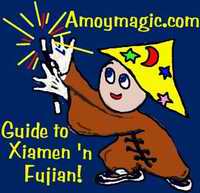
Zhouning Zhouning
Photo Album
The two lane road
to Xiapu is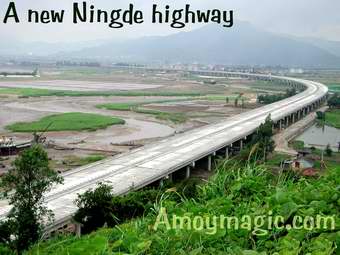 a ribbon of tar barely two lanes wide, and veers around mudflats and slithers
across endless mountains, but great concrete pylons were being driven
far out into the basin of the bay. A few years from now I’ll be
able to streak like an arrow high across valleys, marshes and fishponds
on a new not-so-freeway (the 3-hour Xiamen to Fuzhou drive costs
me over $60 USD in tolls!).
a ribbon of tar barely two lanes wide, and veers around mudflats and slithers
across endless mountains, but great concrete pylons were being driven
far out into the basin of the bay. A few years from now I’ll be
able to streak like an arrow high across valleys, marshes and fishponds
on a new not-so-freeway (the 3-hour Xiamen to Fuzhou drive costs
me over $60 USD in tolls!).
The Xiapu roads wound so tightly I feared I might meet myself coming the
other way. Fields far below are covered with grape arbors, and tea bushes
perch on mountains above.
Between tea and grapes they must really drink in the profits.
A sign in crimson characters said “??” (Xianquan: Celestial
Spring). I almost drank of the Celestial Spring myself when a trucker
came barreling down the middle of the road, hands on his horn. We’d
have scraped each other if Toy Ota had a thicker paint job.
Back to top
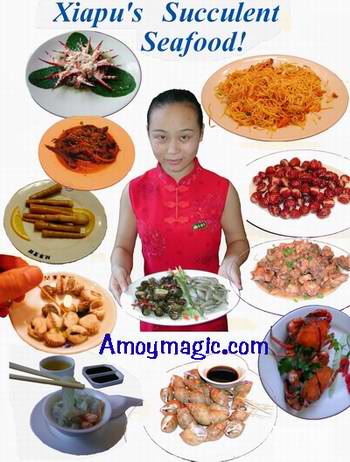
Of Mussels and Men
Two Xiapu Foreign Affairs reps, whose job it is to insure foreigners don’t
have affairs, met me at Xiapu’s “Run Slowly!” sign.
I topped off Toy Ota at the China Petro, then topped off my tummy at the
guesthouse restaurant. And I learned why longtime Xiamen resident Scott
Ballantyne, from England, raves about Xiapu seafood. Read
his essay (where you’ll find why Scott wears a skirt).
Fish Noodles (Yumian) were my favorite dish. My host
said, “These are all over Mindong but ours are best because we have
the freshest seafood. Same goes for blood snails. You can find them from
South Fujian to Dalian in the north, but Xiapu’s are best.”
“And Xiapu beauties are famous,” the driver said. “It’s
because of the pure water and air and soil. Isn’t this waitress
beautiful?” He thrust her before me as if she were part of the menu;
appetizer or entrée I wasn’t sure. I asked if I could check
her teeth but everyone just stared at me. I guess they’d never bought
a horse before.
After the maiden
came mussels, fish, two kinds of crab, deep fried seaweed, and mianrou
(a tasty mix of shellfish and veggies). “The shellfish aren’t
so good today,” my host apologized. “The typhoon yesterday
stirred up the mud.” As if I could tell!
As we evicted hundreds of hapless snails from their shells and ate to
extermination a few dozen species of sea critters, I was given an intro
to Xiapu’s history. I was surprised to learn that backwater Xiapu,
formerly Funing Fu, once administered the entire stretch of coast from
Putian in the south to Zhejiang’s Wenzhou in the north. A stone
with ancient Chinese characters shows Xiapu is older than the hills. The
Japanese bombing and the decline of sea commerce hastened Xiapu’s
decline, but like Ningde, Xiapu is counting on the Fuzhou—Wenzhou
not-so-freeway to revitalize the economy.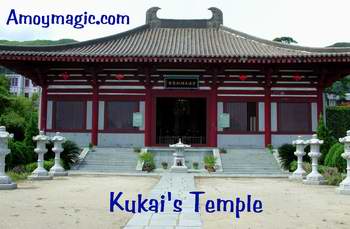
Back to top
Japanese
Holy Land Kukai,
the founder of Japanese Esoteric Buddhism, was rescued by Xiapu people
after being shipwrecked here in 804 A.D.. He went on to study in the ancient
capital of Chang’ An (near present-day Xi’an) and returned
to Japan to found yet another Buddhist sect, the Shingon Sect.
It’s odd how celibate monks become so preoccupied with sects.
Today, Japanese pilgrims visit two or three times yearly, and some take
home small sacks of sand as souvenirs. And it’s obvious Japanese
are the temple’s primary patrons because everything has Japanese
price tags. Kukai’s wooden statue cost 430,000 Yuan. The embroidered
pieces, brought from Japan in 1994, cost 200,000 RMB each. The gold-plated
copper chandelier cost 210,000 RMB! I could have sold them a better fluorescent
lamp for only half that.
Kukai was credited with miracles like creating springs for drought-stricken farmers—but this one has some basis to it. Shikoku’s largest reservoir, which covers 3,600 hectares, was destroyed by a flood in 818. After repeated failures to repair it, Kukai was called in to direct its reconstruction because he was a native of the area. Legends say magic insured his rapid success where others had failed. In fact, his secret was great rapport with the common people, who trusted and loved the man who had abandoned his well off lifestyle to become an ascetic monk. It’s ironic that nowadays so much is spent on his behalf.
After the nickel
temple tour we headed further north to the bamboo rafting area, about
an hour out of Xiapu. I followed a Xiapu government sedan at 90 to nothing
over roads so bumpy that poor Toy Ota was airborne half the time. “We
call these ‘rubber roads,’” the Xiapu FAO rep said.
“But Fujian is spending 7.7 billion Yuan on highways and tunnels.”
“7.7 billion?” I asked. “That’s more than I make
in ten years.”
Back to top 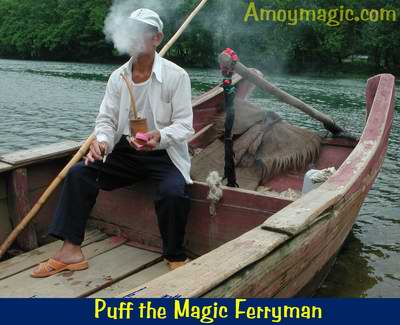
Ferry Man You can’t beat Xiapu’s bamboo rafts and banyans, but the highlight this time around was the pipe-smoking ferryman, Mr. Chen. In his 70s, he still works the river’s ferry daily. Between trips, he puffs on his bamboo water pipe. For every puff he had to stuff the pipe with a pinch of green tobacco, cup it carefully to shield out the wind, and strike a match to it. But he was rewarded each time with a cloud of smoke any dragon would have envied. And though I detest cigarettes, his tobacco smoke had a pleasing aroma, like my dad’s old cherry pipe tobacco.
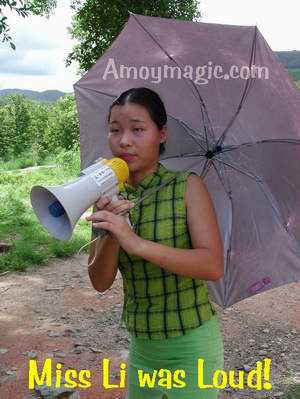
Xiapu
River Rafting http://www.yangjiaxi.com.cn
Our Xiapu River Rafting guide, Miss Li, was armed with a purple umbrella
to ward off the sun, and a megaphone that she kept aimed at my head, even
though we were close enough she could have whispered her narrative (well,
not that close, Susan Marie!).
Village boys doggedly trailed us as if on the scent of a ring-tailed coon,
but I treed them rather than the other way around. Incurable hams, they
happily posed for photos like monkeys, high in the grove of exotic banyan
trees. I remarked on their bright eyes and clear complexions, and a grandpa
said with no little pride, “Pure air, clean water.”
“What about the soil?” I jibed.
“Of course! Lots of minerals, you know.”
Maybe that accounts for Mindong folk’s iron resolve.
We boarded the bamboo rafts and Miss Li stuck her megaphone in my face
and said, “This became a 2nd class scenic area in August of ’98.”
I said, “I hope the rafts are 1st class because my swimming is not.”
She ignored me, and performed the perfunctory Fujian tour guide’s
“Pure Water” lecture. “The river is pure mountain water!
It’s so clean you can drink it without boiling it first. It’s
very medicinal…”
“It looks muddy to me,” I noted.
“The typhoon last week stirred it up,” she said. 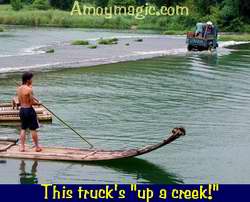
“Well, I could always pretend its coffee,” I said.
Up a Creek! I never underestimate
Chinese, but Xiapu truckers blew me away! They drove right up to the river’s
edge—and then kept going! They crossed it on a narrow dam that I’d
have hesitated to walk across. I figured if they could pilot the river
in trucks, I could trust them to get a bamboo raft upriver without dunking
me.
Back to top
Pregnant
Pythons & Crocodiles
Wild loquats lined the riverbank. In season, five Yuan gets you all you
can pick and eat, but no doggy bags . Miss Li was perched on the bamboo
bench beside me, but she still stuck her megaphone in my ear and said,
“The rocks, cliffs and hills all have names.”
“Really?” I said. I explained I wasn’t into rock but
she rolled on.
“That hill behind ‘turtle rock’ is the golden ox,”
she said. (It was gray granite, not gold). “The rock to the left
resembles a pregnant python sidesaddle on a crocodile. The rock on the
cliff is like a mandarin’s hat—or maybe a tomb. And there’s
a crying carp in that depression over there.”
No wonder it was crying. Five Xiapu farmers, cane poles in hand, were
angling for some of the great golden fish.
Our guide totally ignored a picturesque little waterfall, probably because
it didn’t remind her of anything. But it reminded me of our toilet
in Xiamen, which runs 24 hours a day, all four seasons.
“That island over there is full of butterflies in August,”
said Miss Li.
“This is August,” I said.
“It’s the wrong time of August,” Miss Li explained,
and I think she upped her megaphone a notch out of sheer revenge.
Luny Calendar Maybe Miss Li meant the lunar
calendar. Chinese can really throw us Laowai by switching back and forth,
with no warning and heedless of the Geneva Convention, between Gregorian
and Loony calendars. Someday I’ll probably depart some place three
weeks before I even get there.
“Leaves turn red and gold in autumn,” Miss Li said. “And
when Mandarin ducks arrive in December, we feast on mandarin duck rice,
roasted mandarin duck, and mandarin duck pie, all washed down with mandarin
duck wine.”
The 1,000-year-old Guanyin Hall was just beyond Xiaping Yangcun hamlet,
but the boatmen said, “We must turn back now. The typhoon stirred
the waters too much. Just when I was really getting into Ms. Li’s
lecture.
The forest path to the parking lot was so neatly kept it reminded me of
the orderly German forests where one expects the birds to chirp only on
the hour, sharp. But this forest was not quiet. The cicadas were noisier
than a Cantonese restaurant. I didn’t even hear the card game until
I was right on top of the 3 girls and 1 guy at a granite table beneath
a pine tree. The man laughed as one girl placed her watch on the table.
A wager? Further down the path, two young men played cards at another
mossy stone table, but their hearts weren’t in the game. They furtively
watched the other fellow and his three female friends, and I wondered
if they were scheming to join the party or fuming at being kicked out
of it.
All too soon it was time to leave the beautiful places and people, young
and old, of Xiapu. I will return.
Back to top
Laowai Exchange
My Xiapu hosts handed me over to the Fuding folk so efficiently that I
suspect they even got a receipt for me. And maybe they did. Over 1,000
years ago, the Chinese government gave foreign guests escorts, at government
expense, not to keep an eye on them but to protect them. At each stage
of the foreign friend’s journey they were handed over to new hosts,
and given a receipt—and heaven help any official who allowed a foreigner
to come to harm!
With one Fuding official riding shotgun , Toy Ota tailed the Fuding car
at breakneck speed towards Taimu Mountain. As we bounced violently I apologized
to Toy Ota, though under my breath of course. It would not do to let my
new passenger hear me conversing with my car. That’s not Laowai.
That’s Laoweird.
Click
Here for "My Xiapu Adventure!"
..........by Mr. Scott Ballantyne (Xiamen
ABB)
Back
to Top AmoyMagic
Guide to Xiamen and Fujian
TRAVEL
LINKS  Favorite
Fujian Sites
Favorite
Fujian Sites  Fujian
Foto Album
Fujian
Foto Album  Xiamen
Xiamen
 Gulangyu
Gulangyu
 Fujian
Guides
Fujian
Guides  Quanzhou
Quanzhou
 Zhangzhou
Zhangzhou
 Longyan
Longyan
 Wuyi
Mtn
Wuyi
Mtn  Ningde
Ningde
 Putian
Putian
 Sanming
Sanming
 Zhouning
Zhouning
 Taimu
Mtn.
Taimu
Mtn.  Roundhouses
Roundhouses
 Bridges
Bridges
 Jiangxi
Jiangxi
 Guilin
Guilin
 Order
Books
Order
Books
 Readers'
Letters
Readers'
Letters
Last Updated: May 2007
![]()
DAILY
LINKS
![]() FAQs
Questions?
FAQs
Questions?
![]() Real
Estate
Real
Estate
![]() Shopping
Shopping
![]() Maps
Maps
![]() Bookstores
Bookstores
![]() Trains
Trains
![]() Busses
Busses
![]() Car
Rental
Car
Rental
![]() Hotels
Hotels
![]() News
(CT)
News
(CT)
![]() Medical
& Dental
Medical
& Dental
![]() YMCA
Volunteer!
YMCA
Volunteer! ![]()
![]() XICF
Fellowship
XICF
Fellowship
![]() Churches
Churches
![]()
![]()
![]() Temples
Temples![]()
![]() Mosque
Mosque
![]() Expat
Groups
Expat
Groups
![]() Maids
Maids
![]() Phone
#s
Phone
#s
EDUCATION
![]() Xiamen
University
Xiamen
University
![]() XIS(Int'l
School)
XIS(Int'l
School)
![]() Study
Mandarin
Study
Mandarin
![]() CSP(China
Studies)
CSP(China
Studies)
![]() Library
Library
![]() Museums
Museums
![]() History
History
DINING ![]() Tea
Houses
Tea
Houses
![]() Restaurants
Restaurants
![]() Asian
Asian
![]() Veggie
Veggie
![]() Junk
Food
Junk
Food
![]() Chinese
Chinese
![]() Italian
Italian
![]() International
International![]()
![]() Visas
4 aliens
Visas
4 aliens
RECREATION
![]() Massage!
Massage!
![]() Beaches
Beaches
![]() Fly
Kites
Fly
Kites
![]() Sports
Sports
![]() Boardwalk
Boardwalk
![]() Parks
Parks
![]() Pets
Pets
![]() Birdwatching
Birdwatching
![]() Kung
Fu
Kung
Fu ![]() Hiking
Hiking
![]() Music
Events
Music
Events
![]() Cinema
Cinema
![]() Festival&Culture
Festival&Culture
![]() Humor&
Humor&![]() Fun
Fotos
Fun
Fotos![]()
BUSINESS
![]() Doing
Business
Doing
Business
![]() Jobs!(teach/work)
Jobs!(teach/work)
![]() Hire
Workers
Hire
Workers
![]() Foreign
Companies
Foreign
Companies
![]() CIFIT
(Trade Fair)
CIFIT
(Trade Fair)
![]() MTS(Translation)
MTS(Translation)
![]()
Back to Top
